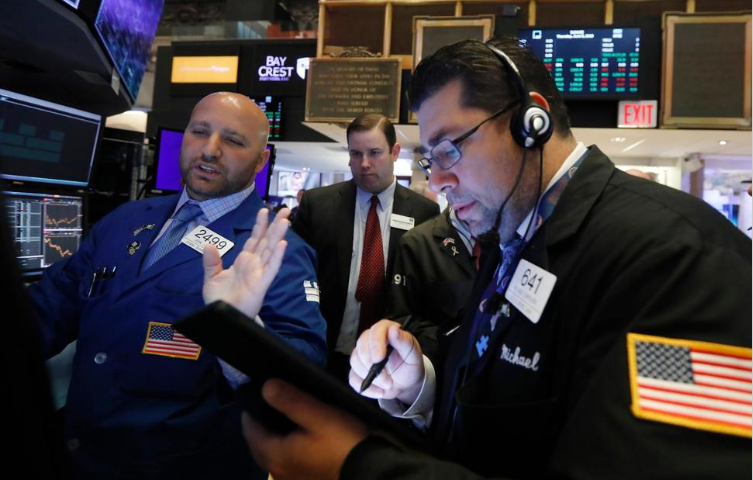Stocks climb to more record highs, helped by industrial companies.
NEW YORK — The major U.S. stock indexes closed at record highs on Friday, with the S&P 500 ending above 3,000 for the first time. The market was driven higher by technology, consumer discretionary and industrial company stocks, which more than offset the drop in drugmakers.
Investors continued to remain focused on the Federal Reserve. The Fed is expected to cut its benchmark interest rate later this month for the first time in more than a decade to help counter slowing economic growth caused by various trade disputes. Investors have bet heavily that the Fed is moving that direction, moving stock and bond yields higher in the last two weeks.
The Dow closed up 243.95 points, or 0.9%, to 27,332.03. The S&P 500 rose 13.86 points, or 0.5%, to 3,013.77 and the Nasdaq composite index rose 48.10 points, or 0.6%, to 8,244.14. All three indexes closed at record highs.
Health care stocks took some of the heaviest losses. Eli Lilly, Merck and Pfizer all fell more than 1%. Pharmaceutical companies also fell on Thursday after the White House withdrew a plan to overhaul the rebates that drugmakers pay insurers and distributors. Investors now expect drugmakers may come under renewed pressure to lower prices.
Separately, another drugmaker, Johnson & Johnson, fell 4.1%. Bloomberg News reported that the company, a Dow component, is under a criminal investigation for possibly lying to the public about the cancer risks found in its ever-popular baby powder.
Industrial companies did well. DuPont rose 2.9%, Emerson Electric added 2.4% and Illinois Tool Works climbed 3.1%. There was positive economic data out of Europe on Friday. Industrial production rose by 0.9% in May, much more than the 0.2% gain that economists had been expecting.
Ford rose 2.9% after announcing that it would team up with Volkswagen to share costs on self-driving and electric vehicles.
Illumina, a genetics toolmaking company, plunged 16.1% after the company announced it was lowering its full-year forecast.
Bond yields have been moving higher for several days, a sign that investors have become more confident that the U.S. economy will continue to produce growth, at least for the next several months. On Wednesday, Fed chairman Jerome Powell told Congress that many Fed officials believe a weakening global economy and rising trade tensions have strengthened the case for a rate cut.
The yield on the benchmark U.S. 10-year Treasury note was 2.12% compared to the multi-year low of 1.95% the bond hit only 10 days ago.
“In our view, the Fed will cut (rates by a quarter of percentage point) since market expectations are near 90%,” Tom Di Galoma, with Seaport Global, wrote in a note to clients.
In other moves, Anheuser-Busch InBev dropped 3% after The Wall Street Journal reported that the beer giant was cancelling plans to spin off its Asian division into a separate publicly traded company.
Investors are preparing for the start of second-quarter earnings season. Major U.S. banks will start reporting their results on Monday, starting with Citigroup. JPMorgan Chase, Wells Fargo and Goldman Sachs will report their results on Tuesday.
Benchmark crude oil rose 1 cent to settle at $60.21 a barrel in New York. Brent crude oil, the international standard, rose 20 cents to $66.72 a barrel.
Wholesale gasoline fell 1 cent to $1.98 per gallon. Heating oil was unchanged at $1.98 per gallon. Natural gas rose 3 cents to $2.45 per 1,000 cubic feet.
Gold rose $5.60 to $1,409.90 per ounce, silver rose 9 cents to $15.16 per ounce and copper rose 1 cent to $2.69 per pound.
The dollar rose to 107.81 Japanese yen from 108.47 yen on Thursday. The euro strengthened to $1.1271 from $1.1258.

